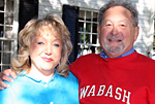

Dr. Norm Armstrong '58 likes to joke about why he chose Wabash College.
"I grew up in a family with eight children-all boys," said the plastic
surgeon, who grew up near Fort Wayne. "I'd been in a male fraternity all my
life. Wabash was a natural choice."
Perhaps it's more appropriate to say Wabash chose Norm. A Wabash
representative sought him out at Northside High School but soon determined
that even with a scholarship, the Armstrong family's finances could not
afford Norm's college education. Wabash President Frank Sparks flew to Fort
Wayne and persuaded E.H. Kilborne to provide an additional scholarship.
Norm also worked in the summers to raise college money.
"At that time the College provided a faculty of superbly qualified scholars
and chose students with a lot of scrutiny," said Norm, who majored in
zoology. "All of us were stimulated to learn and be all that we could be.
Unlike my later experience in medical school, the Wabash professors never
put us in the position of competing with each other. You were always
competing with yourself. I matured in this wonderful melting pot, which had
a profound impact on me."
Even with the financial help, though, Norm kept running out of money and
didn't graduate until 1961. "The dean of students looked me over and said,
'Norm, it's time to get on with your life,'" he quipped.
After Wabash, Norm matriculated at the College of Osteopathic Medicine and
Surgery in Des Moines, Iowa, and did residencies in head and neck and
plastic surgery. He has clinical practices in Piqua and Troy, Ohio. Norm
helped found the Wright State University Academy of Medicine, where he has
taught since 1975. He and his wife Georgia have five grown children and
five grandchildren.
"I attribute most of my personal success to my Wabash instructors-Dr. Ed
Haenish, Dr. Willis Johnson, and Dr. Elliott Williams, to name a few," Norm
said. "Everything I've accomplished I've done so standing on their
shoulders and their leadership."
To show his gratitude, Norm finalized last summer a flip charitable remainder unitrust. This kind of trust
distributes its net income to the recipient until a specified triggering
event, such as a birth, retirement, or death, causes it to switch, or
"flip," to pay out a fixed percentage of its annual fair-market value.
These trusts allow more flexibility in investing for income and growth. The
remaining assets of the trust will benefit Wabash.
"I don't think one can do enough for Wabash for what it did for us," Norm
said. "It goes beyond money. If you attended Wabash, you've got to give to
the College."